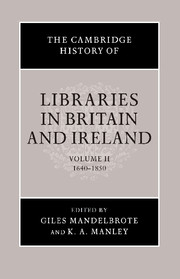Book contents
- Frontmatter
- 1 Introduction: the changing world of libraries – from cloister to hearth
- PART ONE THE EXPANSION OF BOOK COLLECTIONS 1640–1750
- 2 Ancients and moderns: cross-currents in early modern intellectual life
- 3 Libraries, books and learning, from bacon to the enlightenment
- 4 Opportunities for building collections and libraries
- 5 Libraries for school education and personal devotion
- 6 Libraries for the parish: individual donors and charitable societies
- 7 Endowed libraries for towns
- 8 Libraries in university towns
- 9 Ecclesiastical libraries: libraries for the higher clergy
- 10 Libraries for antiquaries and heralds
- 11 Professional collections: libraries for scientists and doctors
- 12 Personal owners of books
- 13 Library buildings and fittings
- 14 Baroque librarianship
- PART TWO LIBRARY DEVELOPMENT AT A LOCAL LEVEL
- PART THREE PROVINCIAL AND METROPOLITAN LIBRARIES 1750–1850
- Select bibliography
- Index
- References
5 - Libraries for school education and personal devotion
from PART ONE - THE EXPANSION OF BOOK COLLECTIONS 1640–1750
Published online by Cambridge University Press: 28 March 2008
- Frontmatter
- 1 Introduction: the changing world of libraries – from cloister to hearth
- PART ONE THE EXPANSION OF BOOK COLLECTIONS 1640–1750
- 2 Ancients and moderns: cross-currents in early modern intellectual life
- 3 Libraries, books and learning, from bacon to the enlightenment
- 4 Opportunities for building collections and libraries
- 5 Libraries for school education and personal devotion
- 6 Libraries for the parish: individual donors and charitable societies
- 7 Endowed libraries for towns
- 8 Libraries in university towns
- 9 Ecclesiastical libraries: libraries for the higher clergy
- 10 Libraries for antiquaries and heralds
- 11 Professional collections: libraries for scientists and doctors
- 12 Personal owners of books
- 13 Library buildings and fittings
- 14 Baroque librarianship
- PART TWO LIBRARY DEVELOPMENT AT A LOCAL LEVEL
- PART THREE PROVINCIAL AND METROPOLITAN LIBRARIES 1750–1850
- Select bibliography
- Index
- References
Summary
Among the most regular users of books on a daily basis were schoolchildren and those pious adults who read the Bible and other ‘godly books’ at home. The two groups were linked by the strong emphasis in contemporary education on Christian knowledge and behaviour, as reflected in the text which a well-drilled Scottish child inscribed on a blank space in the local kirk-session minutes: ‘The fear of the Lord is the beginning of wisdom.’ Not only did libraries available to these groups increase in number and expand in size in all three kingdoms in this period, but in many cases the books were made available to wider circles of readers. Moreover, although the educational and ecclesiastical patterns of each country were very different in 1640, there was a tendency for educational and devotional libraries to become more homogeneous by the mid to late eighteenth century.
This period was characterised by a huge increase in the production of printed school-books, especially in England and Scotland, as a growing number of schoolmasters and ex-schoolmasters published textbooks which were sold in job lots to their own and other schools, and as publishers commissioned further works to feed an obviously growing market. In addition, contemporary theorists stressed the importance of students having access to a wide range of books, and some of them, such as Charles Hoole, indicated exactly which titles should be available. In A new discovery of the old art of teaching schoole (London, 1660), Hoole seems to have had a three-tier system of book storage in mind: each boy should have a box for essential texts used all the time; each class should have a ‘little library’ of subsidiary books, kept under lock and key; and ‘every school of note’ should have a library ‘furnished with all sorts of grammars, phrase-books, lexicons, dictionaries, orators, poets, histories’, etc. for the benefit of the master, and for the senior students to consult.
- Type
- Chapter
- Information
- Publisher: Cambridge University PressPrint publication year: 2006
References
- 1
- Cited by



